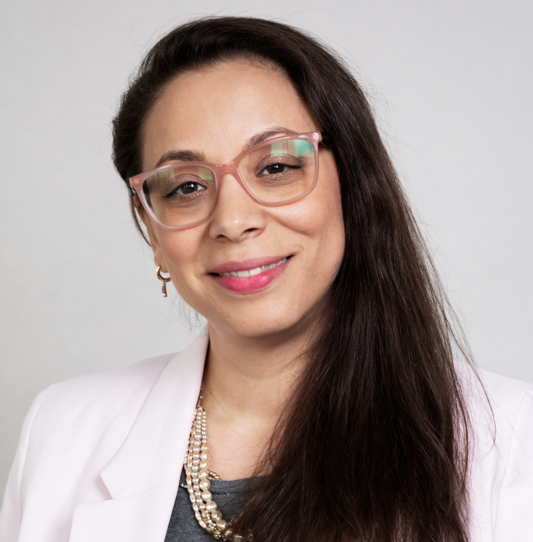
The Equity and Belonging Office Cultivates Community for Students at The New School
Just a few months after joining The New School as the associate vice provost for Student Success in January 2020, Lorenley Báez, now the associate provost for Equity and Belonging, found herself quickly moving to a new operating model designed to provide support remotely to students amid the COVID-19 pandemic. The pandemic resurfaced some of the obstacles the university faced in promoting a sense of community and belonging, which eventually led to the creation of the Equity and Belonging office.
Housed within Student Success, the Equity and Belonging office mission is to foster a uniquely creative and intellectual learning community that values a diversity of identities, perspectives, values, ideas, experiences, and beliefs for students at The New School. Following the model of diversity, equity, inclusion, and belonging (DEIB), Báez and J’Andrea Barrow, manager of the Arthur O. Eve Higher Education Opportunity Program at the university, are focused on cultivating community at The New School, providing access to opportunities, and celebrating diversity through education and outreach. The office recently embarked on a five-year action plan, starting during September 2023, aimed at providing access, advocacy, and services to support students holistically while creating civically engaged global citizens.
“We’re focused on building structures of care and support that will celebrate, explore, examine, and interrogate the diversity of identities, perspectives, values, ideas, experiences, and beliefs of our students. Our focus is student-centered, so we partner with faculty and staff to champion these efforts,” says Báez. Although the office’s main goal is to improve the student experience, she notes that this is work recognized by many around campus as everyone’s responsibility, and the office is finding ways to support the university’s various communities. “There is intersectionality between our work and that of faculty and staff: students’ experiences in the classroom, how they may experience microaggressions, how they may feel being singled out—their experiences of being ‘the only one’—homophobia, and the array of -isms: racism, sexism, classism, antisemitism. So part of our work is partnering with faculty and staff in support of students.”
The office is operating during a difficult time for diversity, equity, and inclusion (DEI) programs, as a backlash has been brewing against these programs at universities and around the country. “Why are people afraid of DEI? There’s a propaganda of fear—fear of what they do not understand, and a fear of change. Nationally, there’s a general fatigue around change. More specifically, a fatigue to dialogue to create change. However, what is critically important is dialogue, and we cannot succumb to fear,” says Báez. “There needs to be an understanding that difference is not the enemy. Difference is what makes each of us and the world around us better. Our differences are what celebrate and empower us, and what draw us to each other.”
Last year, the office organized more than 50 programs celebrating heritage months, recognition days, and religious holidays and created several initiatives during the fall semester providing opportunities through education and outreach. These events are the beginning of the development of spaces designed to highlight the shared and lived experiences of the many diverse groups of people at the university. “The mere presence of a space doesn’t mean you belong, just like the mere presence of admitting Latine students, Black students, or international students doesn’t mean that we’re inclusive and equitable,” says Báez. “There is more to building structures of support and care so that the whole student can be successful and happy here, and creating those experiences aids in our retention and helps students thrive.”
The office uses the belonging design principles created by the Othering and Belonging Institute at the University of California at Berkeley, aimed at structural inequality—to build a world based on inclusion, justice and ultimately, belonging. “What I love about this design is that it’s interactive, it’s engaging, and it just makes sense. It roots out all the jargon that can exist in these types of designs, so that we will be able to have meaningful conversations with students without the higher education babble,” says Báez. “What grounds the principles is the understanding that the root of the problem is othering—we’re consistently othering each other. The big idea is everyone belongs. I mean everyone. The way to get there is by prioritizing structural change—looking at our systems, organizations, and breaking them apart and looking to see if all these pieces actually fit together or are just. It then helps us structurally keep things we need to help us move forward to create positive change.”
This February, the office kicked off Black History Month, and on the week of February 12, they will launch the Belonging Journey, which is the Office’s Beloved Community Initiative. “For this initiative, we’re looking at what it means to be part of this community. We’ll be engaging students around campus—the University Center lobby, Lang Cafe, and the East 16th Street lobby—to participate in an interactive collage making experience to learn what it means to be a part of a community.”
“Community is equivalent to belonging. If students don’t feel a sense of community, then they don’t feel like they belong. Our community is a co-creation. It doesn’t just happen by opening spaces; it is strategic, thoughtful. It’s engagement that is meaningful. We need to hear from students what they think community means and be co-creators in shaping it. When they graduate, they will be an alum of this broad global community. What do they want that to be? You get to design and build that. Let’s think together what this could be.”